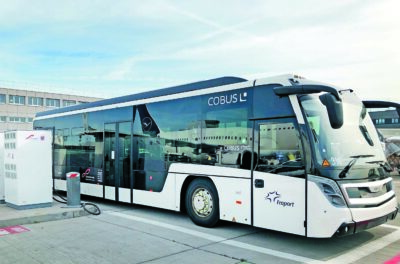Fraport AG is gradually converting its ground services fleet at Frankfurt Airport (FRA) to alternative propulsion methods. To facilitate this process, the company is receiving financial support from the state of Hesse.
Two new funding decisions by Hesse’s state government provide Fraport with a total amount of around €690,000.
Of these funds, €464,000 will be spent on building appropriate charging infrastructure at FRA, while €225,000 will be used to purchase two electric buses for transporting passengers.
In total, Fraport will invest around €1.2 million in expanding charging facilities on Frankfurt Airport’s apron by the end of 2024. Moreover, the airport operating company has earmarked €17 million for equipping specialist ground services vehicles with electric drive systems over the same period.
“Converting our vehicle fleet to electricity is an essential part of our decarbonization strategy,” explains Fraport’s CEO, Dr. Stefan Schulte.
“We’ve set ourselves the ambitious goal of going carbon-free by 2045, both at our home-base airport in Frankfurt and all of our fully-consolidated Group airports worldwide. Meeting this target requires significant investment, an outlay we started making back in the 1990s. We’ve continued to invest since then, despite the crises our industry has faced.” A total of 570 vehicles in Fraport’s fleet at Frankfurt Airport are already powered by electricity, or around 16 per cent of the total.
“The state of Hesse has long actively supported our commitment,” underlines Schulte. Before the current two funding rounds, the state government had already contributed €270,000 towards a pilot project of two fully electric buses for passenger use at Frankfurt Airport over the 2018-21 period. “Our ground handling and energy network professionals have learned a great deal from this trial phase. This has allowed them to develop an appropriate charging strategy that is now ready to be seamlessly integrated into our processes. An essential element of this is building a comprehensive network of charging stations for both standard and rapid charging,” Schulte explains. The new funding from the Hessian state government will be used to build up this strategic network.
GOT NEWS? click here
Google News, Bing News, Yahoo News, 200+ publications
The Hessian Minister of Economics and Transport, Tarek Al-Wazir, points out that Hesse aims to play a trailblazing role in green transport and sustainable mobility: “We’re looking for a transport system that provides mobility for everyone, but with a far lower impact on the environment. We want to achieve carbon neutrality and we need to consider all sectors in the process. In aviation, there are enormous challenges. Aircraft won’t be powered by electricity anytime soon. Nevertheless, they will have to play their part by reducing their fuel use through efficiency and by switching to synthetic fuels. But aside from flight operations, the running of the airport can also be made more environmentally friendly and carbon-efficient. With the support from the Hessian state government, Fraport is continuing its approach of using the greenest ground vehicles available. Fraport’s commitment to the greater use of electric vehicles means the company is heading in the right direction. Each tonne of CO2 that is eliminated helps to protect the climate and brings us a step closer to carbon neutrality. Frankfurt Airport’s new electric charging infrastructure is making a contribution towards this plan.”
Initial project stages to get underway this month
The project for expanding the charging infrastructure at Frankfurt Airport is starting this month with the commissioning of two rapid chargers. Fraport will expand the network by an overall total of 34 rapid charging stations. Two “pop-up charging hubs” are planned as part of the expansion. Each hub includes a steel rack with nine rapid charging points that can be positioned on the airport’s apron as required. In each case, there is room for eight cars or baggage tractors. Alternatively, a charging hub can also supply a bus or an aircraft tractor with electricity. In addition, a dedicated charging depot is planned for the passenger bus fleet used by the ground services teams, including an integrated reservations tool. This allows for tracking of both the availability and the charging levels of the buses.
Media Contact:
Angelika Heinbuch
Corporate Communications
Media Relations
Phone+49 69 690-28417
a.heinbuch@fraport.de








ragnarok private servers
[…]always a massive fan of linking to bloggers that I like but don稚 get a lot of link really like from[…]